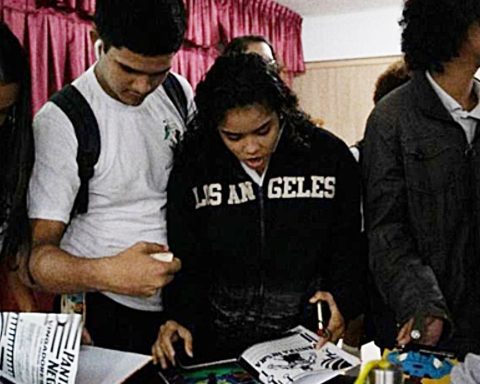The analysis made by the Expert Commission on our political system concluded that there was a high fragmentation of parties in Congress, with many different political forces, and points to this as one of the main difficulties for governing and for governments to implement their agenda. The best example of these difficulties, say specialists, is the current government administration, which has to face negotiations with 21 political parties represented in Parliament. Currently, according to data from the Electoral Service (Servel), there are 13 political parties in formation that, added to the 21 existing ones, would total 34, if those that are in the process of conformation obtain the signatures and are formally constituted. These parties are going to have to speed up their formalization, because the Expert Commission is discussing making it difficult to form new parties and punishing the wayward ones.
Of the parties in formation, there are two that stand out due to their political figures and the media irruption they had with the exit plebiscite in the 2022 constitutional process. The most established is the democrats party, which has a bench of five independent deputies and two senators, Matías Walker and Ximena Rincón, who is the president of the party in formation. Most of its supporters come from the Christian Democrats and are currently in the process of collecting signatures.
The same origin had the party in formation Yellows for Chile, which was born in the heat of the first Constitutional Convention. His president, Cristian Warnken, came to the fore commenting on his apprehensions about the proposal for a new Constitution and, with that, managed to incorporate sectors of the center of the former Concertación into the Rejection. Although Amarillos achieved great exposure in the media, today it only has one parliamentarian, Andrés Jouannet, who also comes from DC.
Competition for Yellows and Democrats
Another party in formation, which also began this process in 2022, is Free Party. A center-right group, based in Providencia, with a slogan that tries to express its liberal spirit: “All freedoms, all the time!” (sic). Its president is Lucas Blaset, a former candidate for deputy for Valparaíso in 2017 and among whose proposals was the privatization of all companies and legalization of all drugs. In the last presidential election he supported Sebastián Sichel.
Another who is trying to see the light is Common Sense Party. Led by the former president of the Democratic Independent Regionalist Party (PRI), Rodrigo Caramori, in its ranks it has former PRI militants and ex-conventionalist Rodrigo Logan, who became known in the mornings and for having very low attendance in the constituent process.
New Time Party it is also on the list of new parties. He defines himself as a Christian and among his fundamental ideas he warns that it is a community “with biblical principles as its foundations.” They believe and recognize “God as the Father and Sovereign of all creation.” Among its main objectives are to “establish and extend the principles of the Kingdom of God in Chile.” His president is the mechanic of Aircraft Systems Juan Paulo Basterrechea, who counts among his jobs having been part of the V Air Brigade in the city of Antofagasta.
Green Ecologist Party It has been trying to be a party for some time, its registration was in 2015. In its beginnings it was part of the Broad Front and the current government coalition, Approve Dignity. However, in 2022 they began the electoral re-registration process because the Servel declared the expiration of its registration and returned to being a party in formation.
Various Greens
There are several parties whose flag is the ecological struggle, one of which is the Party We Are Ecologists, who recently enrolled in February. Camilo Antileo is a member of the party in formation and the Metropolitan Core. The bases of the party are founded on feminism and ecology.
Popular Green Alliance Party Its axis is ecology and sustainability. In addition, the fact of not sharing or supporting the use of “violence, nor non-peaceful methods” is part of its principles.
People’s Party It is a party more linked to the left and whose president is Juan Pablo Sanhueza, a former candidate for deputy for district 9 who became best known when he participated in the controversial and sensationalist program “Sin Filtro”, defending the proposal for a new Constitution of the Constitutional Convention. The slogan of his movement is “Let’s recover the illusion!”.
equality party it is one in formation since 2022, however, before it was a political movement linked to the bases of the mayor Daniel Jadue to compete in the presidential primaries that he lost against the current President Gabriel Boric.
The Progressive Party It is another old acquaintance that in 2022 lost its legality for not reaching the necessary votes to remain in force. His best known political figure is the two-time presidential candidate, Marco Enríquez-Ominami.
Crowd Strength It is another party in formation aimed at changing the political class. “The one who does not comply, ‘PAYS'”, says its web page. Among its principles are the right to life, the integral freedom of each person, equality before the law, individual rights, equal opportunities, the free market, among others. They declare themselves as a party of the center, representative of the middle class and of a minimalist state.
From 2004 to 2023 there have been 53 attempts to form political parties. Several of those attempts failed along the way. There were also four movements that tried to become a party, but were rejected by the Servel between 2012-2023.
complicated picture
To establish itself as a political party, the Servel requires 0.25% of the signatures with respect to the votes cast in the last election and in three contiguous regions. The doctor in political science and professor at the University of Talca, Mauricio Morales, warns that these movements in formation “will hardly be able to establish themselves as a party.” This is because, although the barriers to creating a party are low, “Today several of those parties, such as Amarillos and Demócratas, which were very popular during the constitutional process, are still far from achieving their goal,” says Morales.
On the other hand, he points out that the compulsory vote will also complicate the alternatives of these movements to become parties. This, “because the number of people who will participate in the elections will be greater, so, although the barrier can be maintained at that 0.25%, the requirement for the number of signatures will increase.” For Morales, it is desirable that the proposal for the political system of the new constitutional project increase the requirement to 0.5%, to “avoid a greater proliferation of parties.” “Although the proposal has an exit door from the party to the Chamber of 5% of the votes at the national level for a deputy to be elected, we would also have to worry about the entrance door, increasing the barrier,” he adds.
The doctor in political philosophy and professor at the Adolfo Ibáñez University, Cristóbal Bellolio, warns that the discussion about the fragmentation of political parties and their proliferation “is older than the black thread.” The specialists – he points out – will always prefer a Congress of defined political forces, of great coalitions, because “that facilitates governability”. This configuration –he maintains– is easier to govern than “when there are 40 small parties and each one tries to take advantage of its position. That is logical, we see it in Congress every day, ”he adds.
However, raising the thresholds and requirements to form parties, as the Expert Commission is doing, “sacrifice a certain representation,” says Bellolio. In addition, he adds that if larger parties are made, “not all minorities are going to be represented, but that is the game of politics.” LThe formula has to aim – in the academic’s opinion – “at a delicate balance that must be maintained between governability”. According to him, “generally majority electoral systems achieve it, such as English, and greater representativeness or diversity of representation, generally, proportional systems achieve it.”

















